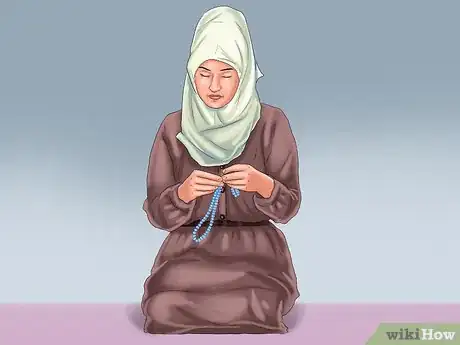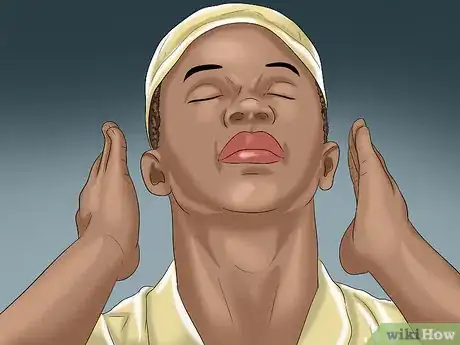wikiHow is a “wiki,” similar to Wikipedia, which means that many of our articles are co-written by multiple authors. To create this article, 29 people, some anonymous, worked to edit and improve it over time.
wikiHow marks an article as reader-approved once it receives enough positive feedback. In this case, 92% of readers who voted found the article helpful, earning it our reader-approved status.
This article has been viewed 96,323 times.
Learn more...
Today, many Muslims are so busy attending to worldly matters that they sometimes forget to be truly grateful for all the blessings that they have. However, it is incumbent upon all Muslims to feel and express their gratitude to Allah (glory be to Him) throughout every day, as it strengthens the faith and helps attain the goal of complete submission to His will. Below are some simple ways Muslims can become more grateful.
Steps
-
1Always remember to say "Alhamdulillah" when you see something that you feel grateful for. After each prayer, spend a few minutes thanking Allah (glory be to Him) for some of the little and big things you have in your life. Acknowledge that Allah (glory be to Him) has created and sustains us, then give thanks for being chosen to be a Muslim, for giving us our faith and for keeping Shaitaan away.
- Remember that Allah (glory be to Him) is always deserving of our thanks and feels displeasure when we are ungrateful.
- Allah's displeasure (glory be to Him) with our ingratitude is not because He needs our thanks, but simply because He knows that a state of grateful servitude is best for us.
- Allah (glory be to Him) may decide to punish our ingratitude, either in this world by sending hardship, or in the next world by sending us to Jahannam (Hellfire), or both.
- The feeling of gratitude comes from the heart and helps us to recognise just how completely dependent we all are upon Allah (glory be to Him).
- Reflect on your own life and you will soon come to appreciate the many blessings that Allah (glory be to Him) has bestowed upon you.
-
2Remember Allah (glory be to Him) at all times during the day and night. Set aside time throughout the day to repeat beautiful phrases from the Qur'an and Sunnah to help remind you of Allah (glory be to Him). These are known as dhikr, plural Adhkar. Dhikr is nutrition for the soul because if we remember Allah (glory be to Him) in this life, then He will remember us in this life and the next.
- Traveling or going about mundane household chores are good times to make dhikr. Many Muslims commit to repeating certain phrases, such as "Subhaan-Allahi wa bihamdihi" (Allah is free from imperfection and all praise is due to Him) numerous times each day, to help them strengthen their faith. This must be done while contemplating the meaning but should not become an excessive burden.
- Every night, before sleep, remember Allah (glory be to Him) by following the regular practices of the Prophet Muhammed (peace be upon him), such as reciting the Adhkar prescribed for the evening, praying Witr before sleep and sleeping on the side.
- Even when enjoying intercourse with your spouse, try to remember that this is both a gift from Allah (glory be to Him) and an act of worship. So remember Allah (glory be to Him) in your heart (though not out loud as this is disliked) and make dua afterwards to thank Allah (glory be to Him) for allowing you to satisfy your desires in a lawful and pleasurable way.
Advertisement -
3When you wake up, remember Allah (glory be to Him) and recite the Du'a for waking up and the morning Adhkar. Give thanks for making it through the night and for being alive. During the day, try to keep mindful of Allah (glory be to Him) by repeating phrases praising, glorifying and thanking Him.
- Even simple phrases, such as "Astaghfirullah", repeated with sincerity, can help save us from the torment of the Fire.
- Thank Allah (glory be to Him) for the limits, laws and punishments that He has set out in the Shariah to help ensure a safe and fair society, and promise to respect them as an expression of gratitude.
-
4Give thanks that you have your friends and family to support you through thick and thin. Many people around the world would love to be able to hug their mum or dad but can't. Many wish to have friends to spend good times with, but do not have the opportunity.
- Remember that every good Muslim is humble and grateful for what they have, even though their life may seem to be a struggle.
- Accept that the struggles and worldly desires that we face are tests planned by Allah (glory be to Him) to strengthen our faith and guide us towards His obedience.
- Keep a gratitude journal. Noting down just one blessing each day - something that has made you say "Alhamdulillah" - together with your reflections on how it has helped you, will help improve focus and strengthen your connection with Allah (glory be to Him).
-
5Say "Masha'Allah" to any one who is blessed. This means "God has willed". Know that jealousy is wrong in Islam, so don't envy the rich. Instead think about the less fortunate. There is always plenty to be grateful for in every life.
- Parents should encourage their young children to recognise and be grateful for their blessings by teaching them to say "Alhamdulillah" and "Masha'Allah" at appropriate times throughout each day. Teaching them to recite Takbir will help them appreciate Allah's greatness (glory be to Him).
- When a little older they should understand that Allah (glory be to Him) sees everything and will be displeased if we fail to show our gratitude. Teach them that Allah (glory be to Him) loves us but there will be consequences in this life or in the next world, or both, if we do not show gratitude for our blessings.
- By the age of ten, children should regularly hurry to acknowledge Allah's gifts (glory be to Him) and know that they will be rewarded for doing so. Conversely, ingratitude should be addressed firstly through education, and if necessary through the mother's normal disciplinary process, just as if a child were to neglect salah.
- Older children should be reminded of the reality that Jahannam (the Fire) is the destiny for those that deny Allah (glory be to Him) His right to receive our gratitude. Allah (glory be on Him) tells us in the Qur'an that gratitude is a characteristic of all good Muslims: If you are grateful, I will certainly give you increase, but if you are ungrateful, My punishment is severe. (Surah Ibrahim: Verse 7)
-
6Thank Allah (glory be to Him) that you're in good health, wealth and state of being. Use the blessings that Allah (glory be to Him) has conferred upon you to do good deeds that will please Him. Thanking Allah (glory be to Him) will only increase your blessings.
- Thank Allah (glory be to Him) every day for making you a Muslim and ask Him to guide you to strengthen your faith and increase you in religious knowledge.
- Our record of gratitude throughout our life will be carefully examined on the Day of Judgement and will play a significant part in determining our fate in the hereafter.
- Ingratitude is symptomatic of being too concerned with worldly affairs and will count heavily against us when the weight of our good and bad deeds are examined.
- If you do recognize that you have been ungrateful, pray to Allah (glory be to Him) for forgiveness. Acknowledge your ingratitude, express regret, promise not to repeat it and ask for forgiveness. Try to offset your ingratitude with a good deed, such as extra prayers or a day of fasting.
-
7Feel motivated and set your intention to be grateful. Gratitude is a beautiful way of acknowledging and obeying Allah (glory be to Him) and provides a wonderful opportunity to earn rewards in this life and the next.
- Remember that worshiping Allah (glory be to Him) is the greatest way of expressing our gratitude to Him and obedience is a great form of worship.
- Try to establish as strong daily routine of worship including regular prayers (salah), remembrance of Allah (glory be to Him) through repeating phrases glorifying Allah (glory be to Him) (dhikr), asking Allah (glory be to Him) for help (dua), Qur'an study and trying to follow the Shariah.
- Regular fasting is a great way of reminding ourselves of Allah's generosity (glory be to Him) and keeping gratitude uppermost in our minds.
- Surround yourself with friends that are naturally grateful, who will encourage you to towards the obedience of Allah (glory be to Him).
- Closely following the Islamic dress code is another good way of expressing gratitude to Allah (glory be to Him).
Community Q&A
-
QuestionDoes Allah stop loving people when they become sinful?
 SobiTop AnswererNo, because Allah is the most forgiving and the most kind. The door of forgiveness never closes and chances are always given for you to repent.
SobiTop AnswererNo, because Allah is the most forgiving and the most kind. The door of forgiveness never closes and chances are always given for you to repent. -
QuestionI'm not satisfied in life, so can't feel like thanking Allah, what can I do?
 Community AnswerAsk yourself why you aren't satisfied. It's very important for you to understand your needs, but be grateful for what you do have: food, shelter, clean water, Internet access, and education. Never forget, Allah will never deprive you of what you deserve. Always keep in mind that Allah never misjudges. You, as a Muslim, should be believer in Taqdir, which means lot or fortune. What is lotted, cannot be blotted, but your hard work may urge Allah to bless you with nice fortune. Lastly, have Taqwa, which means fear and admiration to Allah. Allah loves you and wants to please you with his gifts and blessings.
Community AnswerAsk yourself why you aren't satisfied. It's very important for you to understand your needs, but be grateful for what you do have: food, shelter, clean water, Internet access, and education. Never forget, Allah will never deprive you of what you deserve. Always keep in mind that Allah never misjudges. You, as a Muslim, should be believer in Taqdir, which means lot or fortune. What is lotted, cannot be blotted, but your hard work may urge Allah to bless you with nice fortune. Lastly, have Taqwa, which means fear and admiration to Allah. Allah loves you and wants to please you with his gifts and blessings. -
QuestionWhat can I do to take worries away if I've done bad things on social media?
 AstroDork1535Community AnswerAsk Allah (swt) for forgiveness.
AstroDork1535Community AnswerAsk Allah (swt) for forgiveness.


















-Step-25-Version-2.webp)

















































